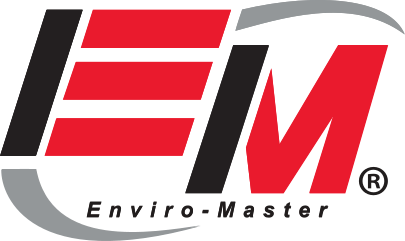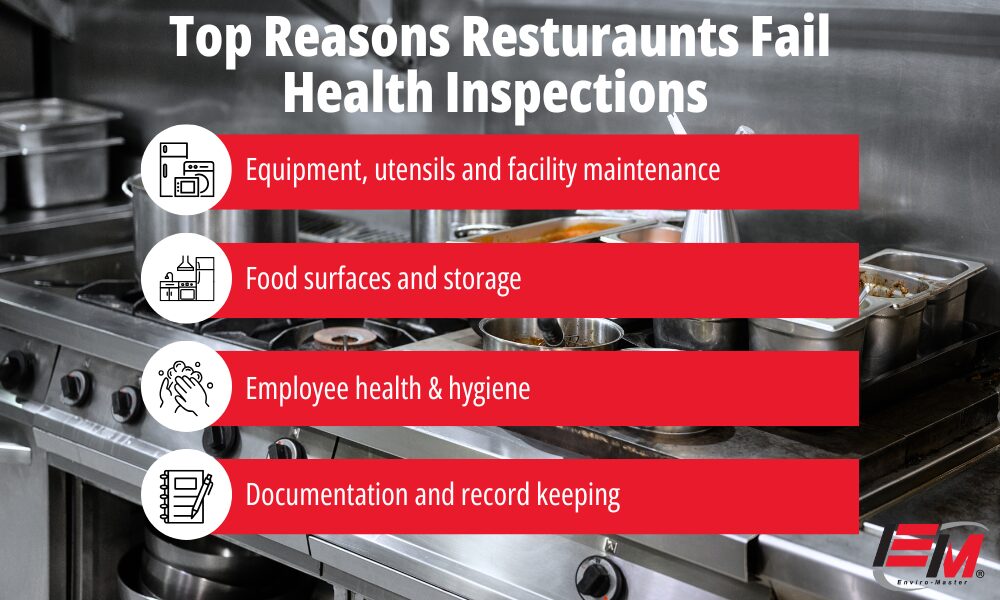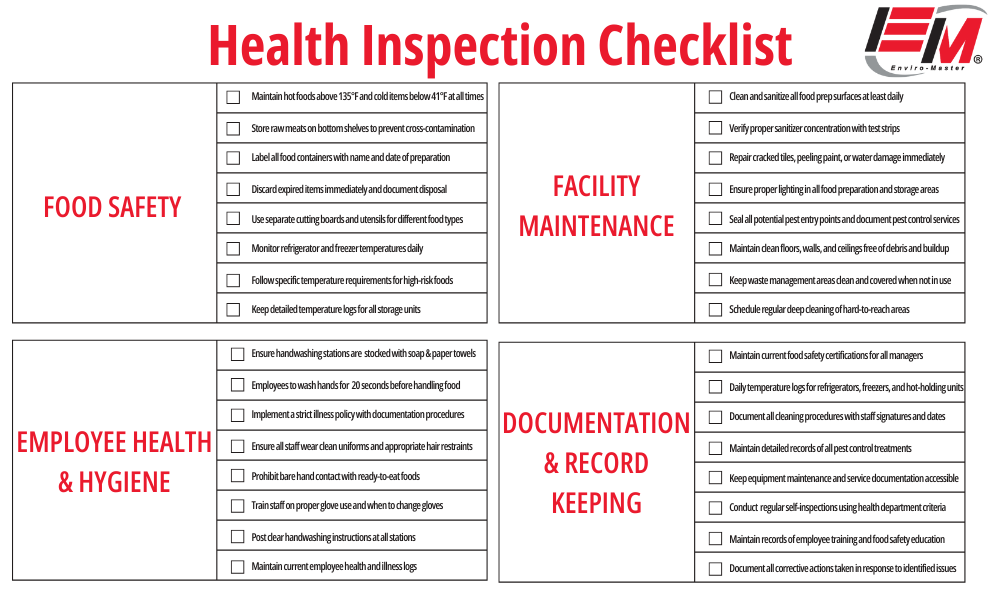Health department inspections play a vital role in ensuring our food safety, with inspectors carefully evaluating restaurants and food service establishments throughout the year. These regular evaluations verify compliance with food safety regulations and protect public health, covering everything from food handling procedures to facility cleanliness. Inspections typically occur 2-4 times annually without prior notice, allowing inspectors to assess real working conditions. High-risk establishments may face more frequent inspections, while lower-risk businesses may see fewer visits. Inspections are typically unannounced, allowing inspectors to assess real working conditions.
Health department inspections play a direct role in preventing foodborne illness outbreaks and protecting both customers and businesses. These vital evaluations are conducted by trained sanitarians from local health departments who examine every aspect of food safety – from proper temperature control and food storage to employee hygiene practices and facility maintenance.
Health inspections play a vital role in ensuring food safety and protecting public health. This guide provides proven strategies and practical advice to help both new restaurant owners and experienced operators maintain high standards and consistently pass inspections while keeping customers safe.
What is Involved in Health Department Inspections
Local health department inspections come in three main forms. Routine inspections happen on a regular schedule, typically 2-4 times per year, depending on your food establishment type. Follow-up inspections occur when violations are found and need verification of correction. Complaint investigations take place when customers or employees report potential foodborne illness risks.
Common Inspection Criteria and Violations
Health inspectors from the local health department focus on four major areas during routine inspections, with each carrying significant weight in the final assessment. Understanding these types of violations helps food establishment operators maintain consistent compliance and food safety standards.
Food Safety Standards
Temperature control ranks among the most frequently cited priority violations. All hot foods must stay above 135°F, while cold items need to remain below 41°F to prevent foodborne illness. However, some foods—like poultry and seafood—may require higher temperatures, so it’s important to follow specific guidelines for each food type.
Proper food storage requires clear labeling, appropriate containers, and correct shelf positioning—raw meats belong on bottom shelves to prevent cross-contamination. Every prepared item needs accurate date marking, and anything past its safe consumption window must be discarded.
Employee Health and Hygiene Protocols
Staff hygiene directly impacts public health. Hand washing stations must be easily accessible, properly stocked with soap and paper towels, and include clear instructions. Workers need clean uniforms, hair restraints, and must avoid bare hand contact when handling food. Any employee showing signs of illness should not handle food items.
Facility Maintenance Requirements
Equipment design plays a major role in passing inspections. All food prep surfaces, necessary equipment, and storage units need regular cleaning and general sanitation. The facility infrastructure must remain in good repair—no cracked tiles, peeling paint, or signs of water damage. Pest prevention requires sealed entry points, regular professional treatments, and proper operational controls.
Documentation and Record Keeping
Accurate inspection records demonstrate consistent compliance. Temperature logs for coolers, freezers, and hot-holding units need daily updates. Employee food safety certification and training records must stay current and accessible. Cleaning schedules should detail daily, weekly, and monthly tasks with staff signatures confirming completion. Health departments may also require additional records, such as employee illness logs, pest control treatments, and cleaning verification logs. These documents provide proof of our ongoing food safety commitment.
Prepare for Health Inspections
Daily maintenance, staff training, and routine inspections form the foundation of passing local health department inspections. Food establishment operators who implement structured operational controls across these areas consistently achieve better inspection results during official visits and maintain safer facilities year-round.
Daily Maintenance Checklist
Start each day with thorough opening procedures: check all refrigeration temperatures and log them, inspect prep areas for general sanitation, and verify sanitizer concentrations. During service, maintain a time-stamped cleaning schedule for high-traffic areas, monitor food temperatures regularly, and keep detailed logs. Closing procedures should include the deep cleaning of all food contact surfaces, proper storage of ingredients, emptying of garbage bins, and sanitizing floors.
Staff Training Programs
Your team needs proper food safety certification, starting with ServSafe or equivalent programs for all managers and key staff. Schedule monthly refresher sessions covering topics like hand washing, cross-contamination prevention, and time-temperature control. Run mock inspections quarterly to help staff understand what health inspectors look for and build confidence in their food safety practices.
Self-Inspection Protocol
Conduct weekly internal inspections using the same forms health departments use. Focus on common priority foundation items like food storage temperatures, employee hygiene practices, and facility maintenance. Schedule monthly deep reviews of all equipment, storage areas, and documentation. Keep detailed records of these self-inspections, including:
- Completed inspection forms
- Temperature logs
- Cleaning schedules
- Maintenance records
- Corrective action documentation
This organized approach to preparation helps identify and fix issues before they become violations during official inspections.
 Professional Solutions for Inspection Success
Professional Solutions for Inspection Success
Regular professional cleaning is one of the most effective ways to maintain consistent compliance with the local health department. Food establishment cleaning services bring specialized knowledge of food safety rules, professional-grade equipment, and proven sanitation standards that help establishments stay inspection-ready every day.
Professional cleaning teams understand the exact requirements inspectors look for and focus on priority foundation items like food preparation surfaces, necessary equipment cleaning, and proper operational controls. They use commercial-grade cleaning solutions and follow detailed checklists for retail food establishments. This systematic approach helps prevent core violations before they become issues during routine inspections.
Working with professional commercial cleaners allows establishment operators to choose service schedules that match their needs.
Maintaining a food establishment that consistently meets local health department standards requires ongoing dedication and attention to detail. Regular routine inspections, proper food safety rules, temperature monitoring, and general sanitation practices form the foundation of a successful inspection report. While your staff handles daily cleaning tasks, professional commercial cleaning services provide the deep cleaning expertise needed to address hard-to-reach areas and maintain the highest sanitation standards.
Trust Enviro-Master
For establishment operators looking to stay ahead of food facility inspections, Enviro-Master provides professional commercial cleaning services designed specifically for food establishments. Our trained technicians use advanced cleaning and sanitization techniques to ensure your facility remains inspection-ready year-round. Trust Enviro-Master to help you maintain food safety, protect your customers, and keep your business compliant with health regulations.
Take action today to protect your establishment’s reputation and maintain consistent inspection results by contacting Enviro-Master. With the right cleaning partnership and daily best practices in place, your food establishment can maintain the high standards that health inspectors and customers expect.



 Professional Solutions for Inspection Success
Professional Solutions for Inspection Success